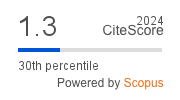The role of heat shock protein (HSP ) as inhibitor apoptosis in hypoxic conditions of bone marrow stem cell culture
Downloads
Background: The concept of stem cell therapy is one of the new hope as a medical therapy on salivary gland defect. However, the lack of viability of the transplanted stem cells survival rate led to the decrease of effectiveness of stem cell therapy. The underlying assumption in the decrease of viability and function of stem cells is an increase of apoptosis incidence. It suggests that the microenvironment in the area of damaged tissues is not conducive to support stem cell viability. One of the microenvironment is the hypoxia condition. Several scientific journals revealed that the administration of hypoxic cell culture can result in stress cells but on the other hand the stress condition of the cells also stimulates heat shock protein 27 (HSP 27) as antiapoptosis through inhibition of caspase 9. Purpose: The purpose of this study was to examine the role of heat shock protein 27 as inhibitor apoptosis in hypoxic conditions of bone marrow stem cell culture. Methods: Stem cell culture was performed in hypoxic conditions (O2 1%) and measured the resistance to apoptosis through HSP 27 and caspase 9 expression of bone marrow mesenchymal stem cells by using immunoflorecence and real time PCR. Results: The result of study showed that preconditioning hypoxia could inhibit apoptosis through increasing HSP 27 and decreasing level of caspase 9. Conclusion: The study suggested that hypoxic precondition could reduce apoptosis by increasing amount of heat shock protein 27 and decreasing caspase 9.
Latar belakang: Konsep terapi stem cell merupakan salah satu harapan baru sebagai terapi medis kelainan kelenjar ludah. Namun, rendahnya viabilitas stem cell yang ditransplantasikan menyebabkan penurunan efektivitas terapi. Asumsi yang mendasari rendahnya viabilitas dan fungsi stem cell adalah tingginya kejadian apoptosis. Hal ini menunjukkan bahwa lingkungan mikro di daerah jaringan yang rusak tidak kondusif untuk mendukung viabilitas stem cell. Salah satu lingkungan mikro adalah kondisi hipoksia. Beberapa jurnal ilmiah mengungkapkan bahwa kondisi hipoksia pada kultur sel dapat menyebabkan sel-sel stres, namun di sisi lain kondisi stres sel juga merangsang heat shock protein 27 (HSP 27) sebagai antiapoptosis dengan menghambat ekspresi caspase 9. Tujuan: Tujuan penelitian ini adalah untuk meneliti peran protein heat shock 27 sebagai inhibitor apoptosis dalam kondisi hipoksia kultur stem cell sumsum tulang. Metode: Kultur stem sel dilakukan dalam kondisi hipoksia (O2 1%) dan mengukur resistensi terhadap apoptosis melalui ekspresi HSP 27 dan caspase 9 stem cell mesenchymal sumsum tulang dengan menggunakan immunoflorecence dan PCR real time. Hasil: Hasil penelitian menunjukkan bahwa prakondisi hipoksia dapat menghambat apoptosis melalui peningkatan HSP 27 dan penurunan tingkat Caspase 9. Simpulan: Studi ini menunjukkan bahwa prakondisi hipoksia dapat mengurangi apoptosis dengan meningkatkan jumlah protein heat shock 27 dan penurunan caspase 9.
Downloads
- Every manuscript submitted to must observe the policy and terms set by the Dental Journal (Majalah Kedokteran Gigi).
- Publication rights to manuscript content published by the Dental Journal (Majalah Kedokteran Gigi) is owned by the journal with the consent and approval of the author(s) concerned.
- Full texts of electronically published manuscripts can be accessed free of charge and used according to the license shown below.
- The Dental Journal (Majalah Kedokteran Gigi) is licensed under a Creative Commons Attribution-ShareAlike 4.0 International License

















